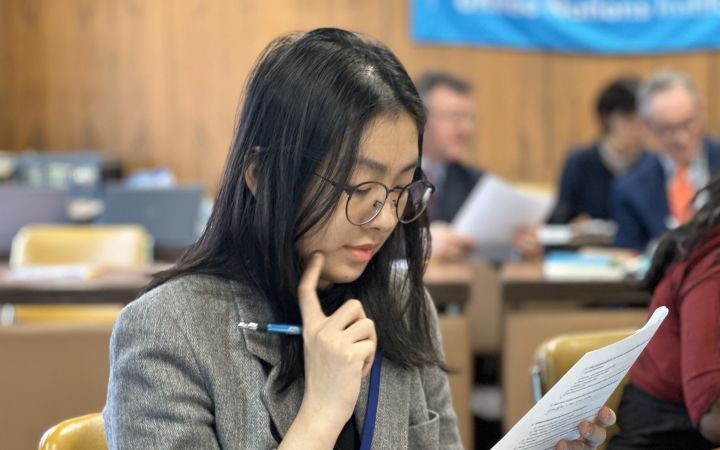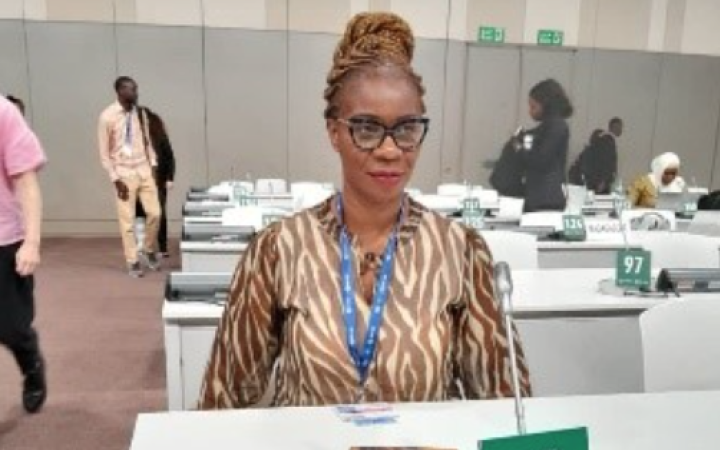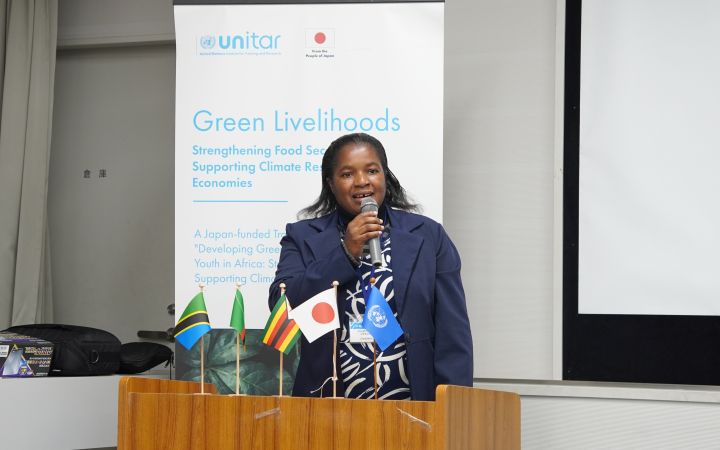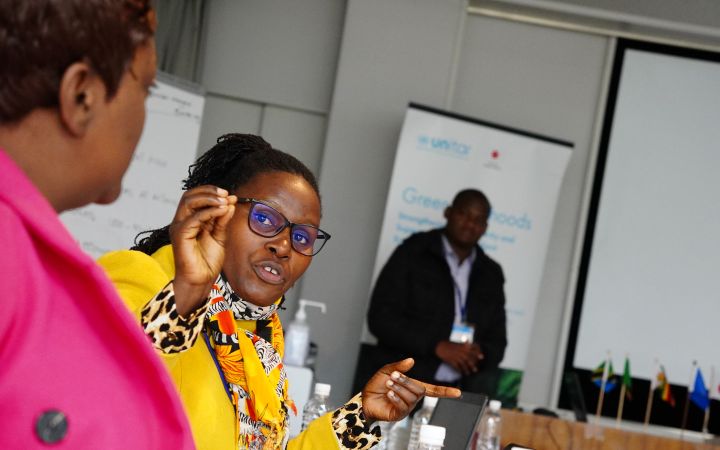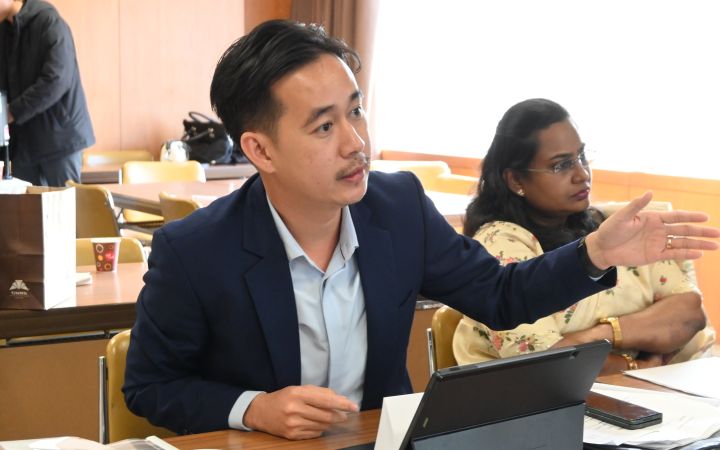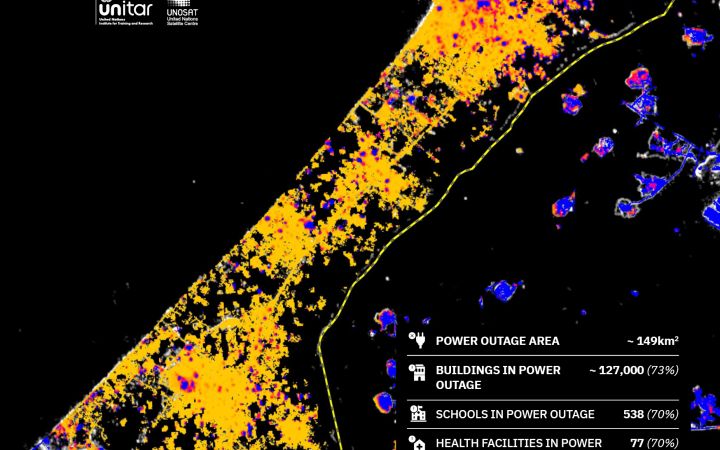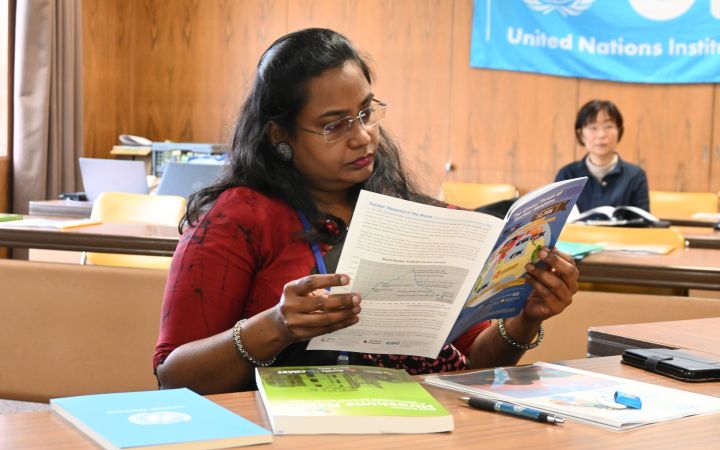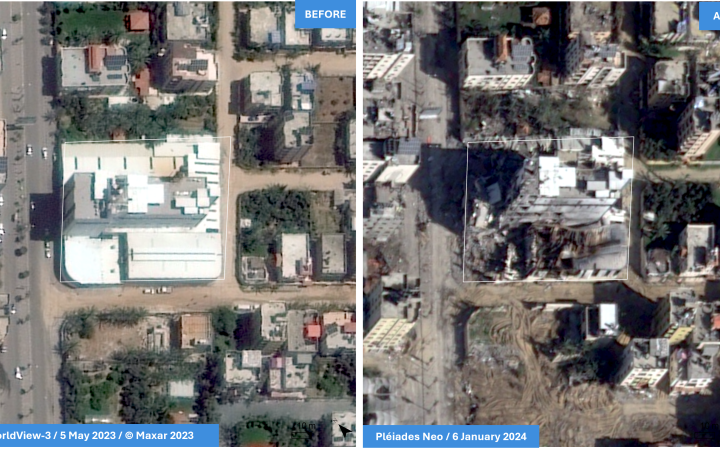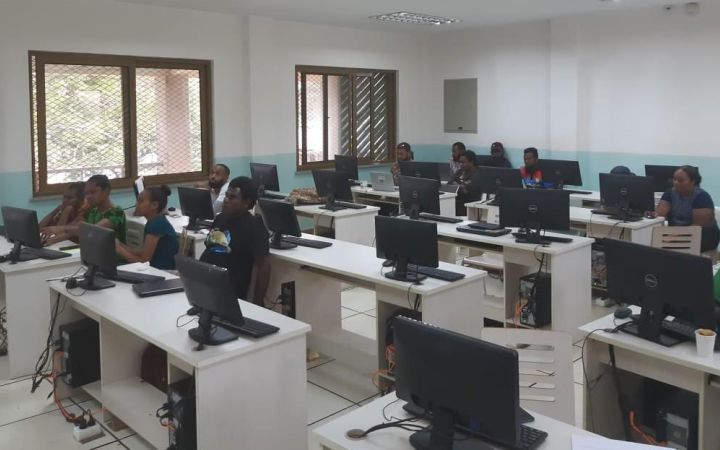Displaying 81 - 90 of 286
22 August 2024, Hiroshima, Japan – Ngan Ha Mai is an official in Vietnam’s Ministry of Foreign Affairs, whose work portfolio focuses on nuclear disarmament, non-proliferation and peaceful development of nuclear technology. She is one of the 18 participants of the 2024 UNITAR Hiroshima Training Programme on Nuclear Disarmament and Non-Proliferation.
Micky Welin's journey in disaster risk management (DRM) showcases the power of education and collaboration in enhancing disaster preparedness and response. Working as the Planning and Logistics Support Officer at Vanuatu's National Disaster Management Office (NDMO), Micky recognised the crucial need for advanced skills in Geospatial Information Technology (GIT) for effective disaster management.
Stepping up as a co-facilitator at COP28 negotiations on gender
Angela, or Angèle as she is called in the Democratic Republic of the Congo (DRC), is a National Gender and Climate Change Focal Point (NGCCFP) at the UNFCCC for the DRC and works as a course guide for the night school for new negotiators organized by the Women’s Environment and Development Organization (WEDO). Initially, Angela was educated in the area of health (tracheostomy). Her journey related to climate change started at COP22 in 2016 in Marrakech, where she met the DRC Delegation, which led to her appointment as Gender and Climate Change focal point.
Angela, or Angèle as she is called in the Democratic Republic of the Congo (DRC), is a National Gender and Climate Change Focal Point (NGCCFP) at the UNFCCC for the DRC and works as a course guide for the night school for new negotiators organized by the Women’s Environment and Development Organization (WEDO). Initially, Angela was educated in the area of health (tracheostomy). Her journey related to climate change started at COP22 in 2016 in Marrakech, where she met the DRC Delegation, which led to her appointment as Gender and Climate Change focal point.
22 August 2024, Hiroshima, Japan – For most people, organic waste is a problem to be managed. But to plant pathologist Dr. Josephine Jere, it is a resource. Josephine believes managing organic waste in urban areas can provide a sustainable means to revive degraded agricultural land, particularly in areas where traditional farming methods have led to soil infertility.
19 August 2024, Hiroshima, Japan – Tanzanian entrepreneur and assistant lecturer Angela Baltazary is passionate about conservation. Through the UNITAR programme on green livelihoods, she developed and embarked on a project to convert the methane in organic waste to protein, which would then be used in her venture that breeds, raises and harvests fish for food. Using organic waste in this way reduces greenhouse gases while contributing to public health and food security in Tanzania.
16 August 2024, Hiroshima, Japan - The threat of a nuclear world war is far from over, with several countries still holding nuclear weapons in their arsenals. As this generation is accountable to future generations, the role of passionate diplomats negotiating for a nuclear-weapons-free world has become more important than ever. One such diplomat is Soksamnang “Sam” Nov from Cambodia. He is currently a First Secretary to the Permanent Mission of the Kingdom of Cambodia to the United Nations in New York. He engages in work related to the First Committee including the Treaty on the Non-Proliferation of Nuclear Weapons (NPT), the Treaty on the Prohibition of Nuclear Weapons ( etc.. He participated in the 2024 UNITAR Hiroshima Nuclear Disarmament and Non-Proliferation Training to further his skills as a diplomat.
The increase in disaster occurrences and the high numbers of victims resulting from conflicts are urgent issues that require effective and rapid action. Satellite imagery analysis is a vital tool essential in this response, as it can cover large areas and provide accurate information in near real-time.
UNOSAT’s Emergency Mapping Service (EMS), funded by the Norwegian Ministry of Foreign Affairs (NMFA), provides satellite image analysis during humanitarian emergencies related to disasters, complex emergencies and conflict situations. With a 24/7 year-round availability to process requests, the team of experienced analysts ensure timely and tailored delivery of satellite imagery-derived maps (both web and static maps), reports and data ready for direct inclusion in Geographic Information Systems (GIS) for evidence-based decision-making and operational planning.
UNOSAT’s Emergency Mapping Service (EMS), funded by the Norwegian Ministry of Foreign Affairs (NMFA), provides satellite image analysis during humanitarian emergencies related to disasters, complex emergencies and conflict situations. With a 24/7 year-round availability to process requests, the team of experienced analysts ensure timely and tailored delivery of satellite imagery-derived maps (both web and static maps), reports and data ready for direct inclusion in Geographic Information Systems (GIS) for evidence-based decision-making and operational planning.
Prashanthi Krishnamoorthy is the deputy director of the South Asia Division at the Sri Lanka Foreign Service, where she manages bilateral relations with India, Maldives and Pakistan. Prashanthi took part in the FY2023 UNITAR Hiroshima Training Programme on Nuclear Disarmament and Non-Proliferation to enhance her ability to support and advance global disarmament and non-proliferation efforts.
The increase in disaster occurrences and the high numbers of victims resulting from conflicts are urgent issues that require effective and rapid action. Satellite imagery analysis is a vital tool essential in this response, as it can cover large areas and provide accurate information in near real time.
UNOSAT’s Emergency Mapping Service (EMS), funded by the Norwegian Ministry of Foreign Affairs (NMFA), provides satellite image analysis during humanitarian emergencies related to disasters, complex emergencies and conflict situations. With a 24/7 year-round availability to process requests, the team of experienced analysts ensure timely and tailored delivery of satellite imagery derived maps (both web and static maps), reports and data ready for direct inclusion in Geographic Information Systems (GIS) for evidence based decision making and operational planning.
UNOSAT’s Emergency Mapping Service (EMS), funded by the Norwegian Ministry of Foreign Affairs (NMFA), provides satellite image analysis during humanitarian emergencies related to disasters, complex emergencies and conflict situations. With a 24/7 year-round availability to process requests, the team of experienced analysts ensure timely and tailored delivery of satellite imagery derived maps (both web and static maps), reports and data ready for direct inclusion in Geographic Information Systems (GIS) for evidence based decision making and operational planning.
At a time when natural disasters are becoming more numerous and frequent, UNOSAT aims to equip all countries with geographical information systems (GIS) to make informed decisions and reduce the risks associated with these natural disasters. To this end, UNOSAT has set up the project ‘Strengthening Capacities in the Use of Geospatial Information for Improved Resilience in Asia-Pacific and Africa’. The project focuses on developing the capacity to use GIS in government agencies across eight partner countries: Bangladesh, Bhutan, Fiji, Lao PDR, Nigeria, Solomon Islands, Uganda, and Vanuatu.


